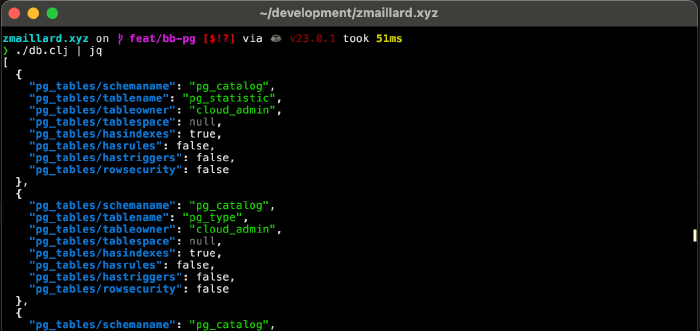Babashka + PostgreSQL
Nov. 10, 2024 (Updated: Nov. 12, 2024)Recently I learned about the Babashka which is bills itself as a “Fast native Clojure scripting runtime”. It has most of the benefits of Clojure, but has the fast startup time associated with the GraalVM, on which it is based. While, it is not necessarily a Clojure replacement, it does make Clojure more accessible to everyday tasks one might do on the shell. In fact, since I have discovered this tool, it is the first thing I reach for when I need to write a shell script.
One of the things that comes up from time to time, is you need to write a small script that involves a database. I would call this kind of script a “throw-away” script. In times past, I would reach of something like Python, or maybe C# at work. Babashka however, comes pre-loaded with a bunch of libraries out of the box. It also supports loading additional programs called Pods. Pods can be used as Clojure libraries, once they have been loaded into the code. A list of Pods are here.
Normally, pulling in a remote resource from a registry would involve some extra setup work - like running pip for Python, or NuGet for a .NET project. In the case of a Pod, Babashka will automatically pull down the correct Pod from the registry, if it is not already loaded on the system. Below is a simple Clojure script that prints out the list of tables in the database:
#!/usr/bin/env bb
; Load PostgreSQL POD
(require '[babashka.pods :as pods])
(pods/load-pod 'org.babashka/postgresql "0.1.2")
; Now that Pod is available - require like a regular
; Clojure namespace
(require '[pod.babashka.postgresql :as pg]
'[cheshire.core :as json]) ;Json Support
; Assuming database parameters are stored as environment variables
; build up conection information
(def db {:dbtype "postgresql"
:host (System/getenv "DB_HOST")
:dbname (System/getenv "DB_NAME")
:user (System/getenv "DB_USER")
:password (System/getenv "DB_PASSWORD")
:port (System/getenv "DB_PORT")})
; Function to list tables in database
(defn print-tables
[]
(pg/execute! db ["SELECT * FROM pg_catalog.pg_tables"]))
; Parse output as json and print tables to console
(println (json/generate-string(print-tables)))
Because I have specified the bb interpreter for the script, I can simply run the script like: ./db.clj. To show that it is just like a normal shell script, I can pass the Json output to jq to for further handling.
./db.clj | jq
Ouput